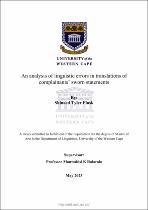| dc.description.abstract | English remains the official language of record in South Africa and is used in most, if not all, aspects of the justice system (Ralarala, 2014). As a result, sworn statements made by complainants in any of the other official languages are translated by police officers into English to be used as evidence in a court of law. Police personnel are not sworn translators or interpreters and are not required to be. This has major implications for the legal process as well as for the complainant. When evidence is presented in court in South Africa, a sworn statement supersedes any oral story, and therefore inaccuracies in the translated version have profound consequences. Linguistic errors which creep into written translations made by police officers alter the authenticity of the sworn statement and result in discrepancies between oral testimony and written testimony. These discrepancies have serious legal implications and could constitute a miscarriage of justice, impeding complainants’ access to justice. The study of linguistic errors is usually found in research related to language learning and teaching; to the best of my knowledge, such research is sparse in relation to Forensic Linguistics. | en_US |

